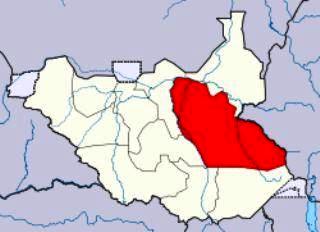UN renews pledge for peace in Jonglei
August 27, 2013 (BOR) – Officials from the United Nations Mission in South Sudan (UNMISS) have reiterated their commitment to restore peace and stability in the country’s largest state of Jonglei.
 The pledge was made Monday during a one-day forum organised for students in the capital, Bor.
The pledge was made Monday during a one-day forum organised for students in the capital, Bor.
Organized by the UN public information office, the meeting brought together 12 students drawn from both primary and secondary schools in Bor.
Mike Dzakuma, the acting UNMISS state coordinator, said the world body would, as part of its mandate, strive to ensure normal peace returns to the region.
“We will do anything to assist [in] the return to peace in Jonglei state”, he said.
Jonglei has, in recent months, experienced a cycle of violence, in form of tribal conflicts, cattle raids and rebel insurgency.
Up to 100,000 people, according to the UN, have been displaced as a result of conflict in Jonglei, with its Security Council strongly condemning attacks on civilians in the region.
Gai Riam, the acting state governor, said the region has never experienced peace since conflict broke out in Sudan in 1956.
“South Sudan had crossed so many rivers, but finally we are at home with multi-problems, some of which were created by us”, Riam remarked.
He reminded the forum attendees of the 1991 split, when a group led by ex-vice president, Riek Machar, broke away from the Sudan People’s Liberation Movement/Army (SPLM/A).
“Remember in the middle of 1991, we had to go to war with our selves. And most of the people who suffered were [the] Nuer and Dinka, [who] had almost finished themselves” said the acting governor.
It is now a war of no purpose, he stressed, adding that the political leaders then later reconciled leaving out grass root citizens.
Riam, however, expressed concerns that the Jonglei peace committee, headed by Archbishop Daniel Deng Bul, had not yielded positive outcomes. The agreement was signed in May 2012.
He stressed that government remains committed towards resolving the conflict in the region.
Discussions at the forum mainly centered on the urge to improve road and communication networks, deployment of well trained police in the communities, reduction in bride prices, elimination of corruption and nepotism in the state, among others.
At least two student representatives from each tribe in the state, attended the one-day forum.
(ST).
